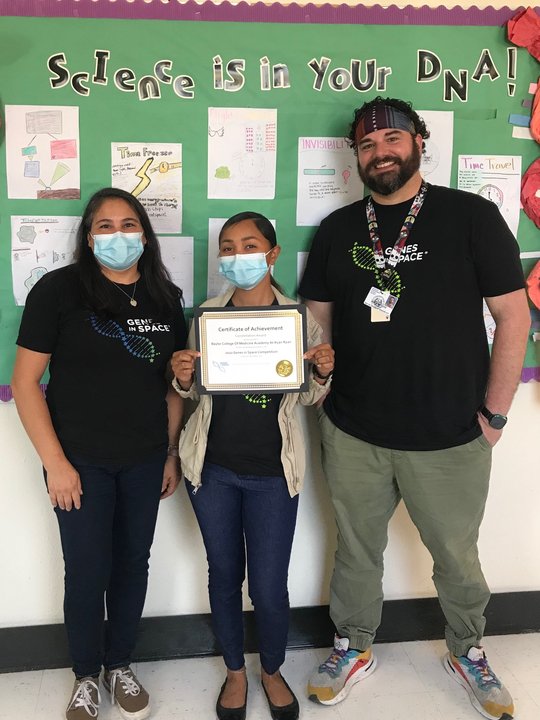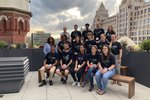GiS Spotlight: Constellation Awardee Baylor College of Medicine Academy
The Constellation Award celebrates an educational institution’s collective enthusiasm for science and space. The five awards are given to the educational institution with the highest number of submissions from each of the major US geographic regions. Baylor College of Medicine Academy at James D. Ryan Middle School in Houston, Texas is the 2022 Constellation Award winner for the Southwest region. This is the sixth win for BCMAR! We asked BCMAR's Luke Aguilar a few questions about his students' Genes in Space experience.
 Dr. Beatriz Perez-Sweeney (left), Raquel Torres (middle), and Luke Aguilar (right)
Dr. Beatriz Perez-Sweeney (left), Raquel Torres (middle), and Luke Aguilar (right)
Tell us a little bit about yourself and your school: My name is Luke Aguilar and I teach Foundations in Biotechnology and Bioengineering course with Raquel Torres. I have been teaching the course for 5 years now.
As a magnet school, BCMAR accepts scholars from all over the greater Houston area, representing all the different races, cultures, languages, and nationalities that make up our amazing city. As a middle school campus, we host grades 6-8 and in partnership with Baylor College of Medicine, prepare our scholars for the rigors of advanced high school curriculums, in and outside of the medical field.
For how many years have you been using Genes in Space in your classroom? I have personally participated in the Genes in Space contest for all five years that I have been teaching at BCMAR, but this was our sixth year as contenders and our sixth year receiving the Constellation Prize.
What has changed over the time you have been using Genes in Space in your curriculum? The first year I participated, in 2018, I was a very “green” teacher and had a hard time figuring out how to get my students excited about a contest going on while state assessments were simultaneously taking place. I was able to attend a Genes in Space workshop and that helped me to get thrilled for all the possibilities Genes in Space had to offer, and I was able to transfer that emotion and sense of urgency over to my students.
Through the years, I have become more comfortable with the program and have found more ways to tie the contest in with current news and events as well, which adds relevance and excitement. This year, we had actual geneticists speak to our students, which created even more excitement. We even had students taking avid notes that had never displayed much interest in class before, showing evidence of a shift in meaningful curiosity.
What did your students gain by participating in Genes in Space? My students gained a real-world appreciation for science in action. Often, students tend to wonder why they are learning the things they are learning, and what the knowledge can do for them beyond the classroom. This is where the beauty of the Genes in Space project lies. Genes in Space is not about solving hypothetical problems with theoretical solutions, Genes in Space focuses on actual issues that our current space travelers face, and the challenge is to come up with a valid potential solution. I cannot stress how valuable this is to the students once they realize they truly do have the ability to change the world for the better.
Do you have any advice for teachers thinking about using Genes in Space in their classrooms? The best advice I could give would be the same advice any educator would say concerning any project or assignment: “Enthusiasm is infectious. Get excited and your students will as well.” Genes in Space is a wonderful way to take classroom instruction and extend that knowledge and expertise to the current climate in real time. That is what education and learning is all about. Hold your students to a higher standard and you might be surprised with what they are able to accomplish.


